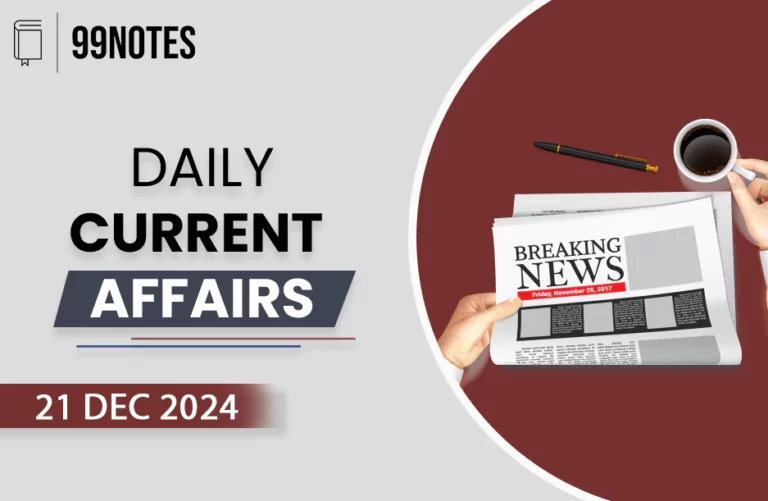27 July 2023 : Daily Current Affairs
DAILY CURRENT AFFAIRS
Daily Current Affairs For UPSC ,Daily Current affairs of The hIndu and Indian Express.
27-July-2023
1. No-trust motion against Modi govt. admitted in LS.
Topic: GS2 – Indian polity.
Context:
- Lok Sabha Speaker, Om Birla, has admitted a no-confidence motion against the Modi government.
- The motion was moved by Gaurav Gogoi, the Congress’s Deputy Leader in the House.
- The purpose of the motion is to force the Prime Minister to speak in Parliament on the Manipur conflict.
About no-confidence motion:
- A no-confidence motion is a parliamentary procedure used to test the support and confidence of the ruling government in the legislature.
- It is moved by a member of the opposition to express lack of confidence in the current government’s ability to govern effectively.
- If the motion is admitted, a debate is scheduled in the parliament to discuss the issues raised by the opposition.
- The motion requires the backing of at least 50 Members of Lok Sabha to be admitted.
- During the debate, members vote to express their confidence or lack of confidence in the government.
- If the motion is passed, the government is deemed to have lost the confidence of the house, and it may lead to the government’s resignation or dissolution of the parliament, leading to fresh elections.
Procedure for no-confidence motion:
- A no-confidence motion is moved by a member of the opposition in the Lok Sabha.
- The member submits a written notice to the Speaker of the House expressing lack of confidence in the current government.
- The notice must be supported by at least 50 Members of Parliament.
- The Speaker examines the notice to ensure it meets the required criteria and decides whether to admit it.
- If admitted, the Speaker schedules a debate on the motion in the parliament.
- During the debate, members discuss the issues raised in the motion and the government’s performance.
- At the end of the debate, a vote is taken to express confidence or lack of confidence in the government.
- If the majority of members vote against the government, the motion is passed, and the government is deemed to have lost the confidence of the house.
Model question: What is a no-confidence motion in the Indian Parliament, and how does it function as a mechanism to test the government’s mandate and accountability? Provide a brief analysis of its implications on the government’s stability and the functioning of the legislative body.
2. Bill proposes birth record digitisation
Topic: GS2 – Indian polity.
Context:
- India is taking steps to generate digital birth certificates that will serve as an all-encompassing document for various purposes.
More information about the news:
- The digital birth certificate will be used for admissions to educational institutions, job applications, passport issuance, Aadhaar enrollment, voter registration, marriage registration, and other official purposes.
- The Registration of Births and Deaths Amendment Bill, 2023, has been tabled in the Lok Sabha to implement this change.
- The Bill makes it mandatory for States to register births and deaths on the Centre’s Civil Registration System portal and share the data with the Registrar General of India under the Union Home Ministry.
- The centralised register will help update other databases, ensuring efficient and transparent service delivery and social benefits.
- The new rules will apply to all individuals born after the Bill becomes law.
- The Bill also aims to collect Aadhaar numbers of parents and informants for birth registration and facilitate the registration process for adopted, orphaned, abandoned, surrogate children, and children of single parents or unwed mothers.
3. LS passes Forest Conservation (Amendment) Bill
Topic: GS2 – Indian polity.
Context:
- The Lok Sabha passed the Forest Conservation (Amendment) Bill without any changes from the first version introduced on March 29.
More information about the news:
- The Bill aims to amend the Forest Conservation Act, 1980, which empowers the Centre to ensure proper compensation for forest land diverted for ‘non-forestry’ purposes.
- The amendments encourage cultivating plantations on non-forest land to increase tree cover, act as a carbon sink, and support India’s goal of achieving ‘net zero’ carbon emissions by 2070.
- The amendments also seek to remove restrictions on creating infrastructure for national security and livelihood opportunities for communities living on the forest periphery.
Opposition to the Bill:
- The Bill faced objections from various groups, including tribal rights groups and think-tanks, with around 1,300 representations sent to the Joint Parliamentary Committee (JPC) to investigate the Bill.
- The objections raised concerns about diluting the Supreme Court’s 1996 judgement in the Godavarman case and the Act’s new name, which some considered non-inclusive.
4. Parliamentary privilege breached: Kharge
Topic: GS2 – Indian polity.
Context:
- Congress president and Leader of the Opposition in the Rajya Sabha, Mallikarjun Kharge, expressed his displeasure on Wednesday, stating that he felt “insulted” when his microphone was turned off while he was speaking during the session on Tuesday.
- Kharge considered this incident a breach of his parliamentary privilege and expressed that his self-respect was challenged.
About Parliamentary privileges:
- Parliamentary privileges are special rights and immunities granted to members of the parliament to perform their duties without hindrance and interference from external authorities.
- These privileges are essential for the functioning of the parliament and its members to safeguard the independence and integrity of the legislative body.
- Parliamentary privileges include freedom of speech and expression within the parliament, immunity from legal proceedings for anything said or done during parliamentary proceedings, and exemption from jury service while serving as a member of parliament.
Parliamentary privileges as per Indian constitution:
In the Indian context, parliamentary privileges are enshrined in Article 105 of the Constitution. The Indian Constitution grants certain special rights and immunities to members of Parliament (MPs) to enable them to perform their duties effectively and independently. Here are the key parliamentary privileges as per the Indian Constitution:
- Freedom of Speech and Expression: MPs have the freedom to speak and express their opinions in the Parliament without the fear of legal action or prosecution.
- Immunity from Legal Proceedings: MPs are immune from any civil or criminal proceedings in respect of anything said or any vote given by them in Parliament or its committees.
- Freedom from Arrest: MPs enjoy freedom from arrest in civil cases during the continuance of a session of Parliament and 40 days before its commencement, to enable them to attend the proceedings without any hindrance.
- Exemption from Jury Service: MPs are exempted from serving as jurors in any court.
- Access to Information: MPs have the right to seek and receive information on parliamentary proceedings and other relevant documents.
- Power to Punish for Breach: Each House of Parliament has the authority to punish any person (including its members) for breach of its privileges or contempt of the House.
Model question: “Explain the concept of parliamentary privileges in the Indian context. Discuss their importance in ensuring the smooth functioning of the legislature and protecting the rights of Members of Parliament (MPs). Also, highlight any potential challenges or limitations associated with parliamentary privileges.”
5. Opposition MPs walk out of parliamentary panel meet on Personal Data Protection Bill
Topic: GS2 – Indian polity.
Context:
- Opposition members walked out of a meeting of the Parliamentary Standing Committee on Information Technology.
- The walkout was in objection to the panel’s adoption of a “laudatory” report on the Digital Personal Data Protection Bill, 2023.
About Parliamentary standing committees:
- Parliamentary standing committees are permanent committees that are constituted by Parliament to examine and analyze various issues related to legislation and governance.
- These committees are an essential part of the Indian parliamentary system and play a crucial role in scrutinizing government actions, policies, and budgets.
- There are different types of standing committees, such as the Committee on Finance, Committee on Home Affairs, Committee on Information Technology, etc., each focusing on specific areas of governance.
- Members of these committees are drawn from both houses of Parliament (Lok Sabha and Rajya Sabha) and are usually nominated by the Speaker or Chairman, respectively.
- The main function of these committees is to review and analyze bills and legislation, study budgetary allocations and expenditures, and oversee the functioning of various government ministries and departments.
- They also have the authority to summon government officials and experts for evidence and examination during their proceedings.
- The recommendations and reports prepared by these committees are considered crucial in shaping public policies and government decisions.
6. New clue to FRBs, mysterious radio flashes from space
Topic: GS3 – Science and technology.
Context:
- Fast radio bursts (FRBs) are mysterious emissions of radio light from distant galaxies, reaching Earth in short, sharp bursts of energy.
- Astrophysicists have identified hundreds of FRBs, but their precise origins and why they appear in such short bursts remain largely unknown.
- Some FRBs are one-off events, while others are repeaters that emit radio waves intermittently.
- An international team of astronomers studied a repeating FRB called FRB 20190520B and found that its Faraday rotation measure, indicating magnetic field strength, was highly variable and reversed direction twice.
- This magnetic reversal suggests that the FRB source may be orbiting a binary star system with a companion star, possibly a massive star or a black hole.
- The study’s findings provide new insights into the nature of FRBs and the potential role of binary star systems in their generation.
- Radio telescopes are essential tools in studying FRBs and other cosmic phenomena as they can detect radio emissions from faraway heat sources.
- Advanced radio telescopes like the Very Large Array, Five-hundred-meter Aperture Spherical radio Telescope, and others allow astronomers to study FRBs with greater precision and investigate their host galaxies.
For Enquiry

27 July 2023 : Daily Current Affairs

26 July 2023 : Daily Quiz

25 July 2023 : Daily Quiz

26 July 2023 : The Hindu Editorial Notes PDF

26 July 2023 : PIB

26 July 2023 : Daily Current Affairs

25 July 2023 : The Hindu Editorial Notes PDF

25 July 2023 : PIB

25 July 2023 : Daily Current Affairs

24 July 2023 : Daily Quiz
Daily Current Affairs 27 July 2023 : Daily Current Affairs DAILY CURRENT AFFAIRS
26-July-2023
Daily Current Affairs For UPSC ,Daily Current affairs of The hIndu…
Daily Quiz 26 July 2023 : Daily Quiz 26 July 2023 : Daily Quiz…
Daily Quiz 25 July 2023 : Daily Quiz 25 July 2023 : Daily Quiz…
The Hindu 26 July 2023 : The Hindu Editorial Notes PDF The Hindu Editorial
26-July-2023
Daily Current Affairs For UPSC ,The Hindu Editorial Summary
Facebook-f
Twitter
Youtube
1. Moving…
PIB 26 July 2023 : PIB PRESS INFORMATION BUREAU
26-July-2023
Daily Current Affairs For UPSC ,The PIB ( Press Information Bureau…
Daily Current Affairs 26 July 2023 : Daily Current Affairs DAILY CURRENT AFFAIRS
26-July-2023
Daily Current Affairs For UPSC ,Daily Current affairs of The hIndu…
The Hindu 25 July 2023 : The Hindu Editorial Notes PDF The Hindu Editorial
25-July-2023
Daily Current Affairs For UPSC ,The Hindu Editorial Summary
Facebook-f
Twitter
Youtube
1. An…
PIB 25 July 2023 : PIB PRESS INFORMATION BUREAU
25-July-2023
Daily Current Affairs For UPSC ,The PIB ( Press Information Bureau…
Daily Current Affairs 25 July 2023 : Daily Current Affairs DAILY CURRENT AFFAIRS
25-July-2023
Daily Current Affairs For UPSC ,Daily Current affairs of The hIndu…
Daily Quiz 24 July 2023 : Daily Quiz 1. Since the implementation of economic reforms in 1991, India has witnessed significant growth in various…



